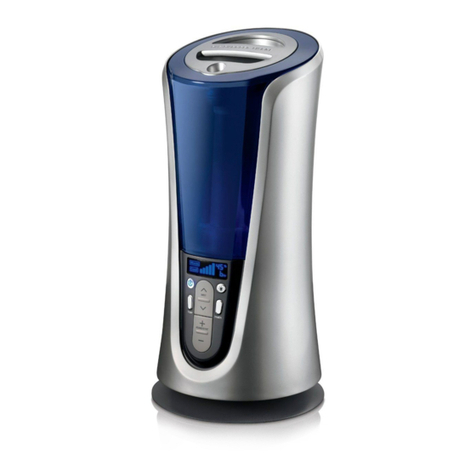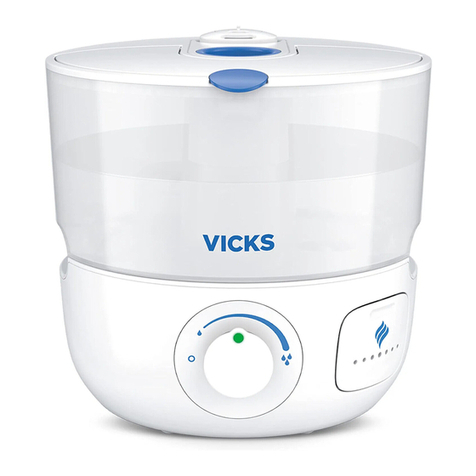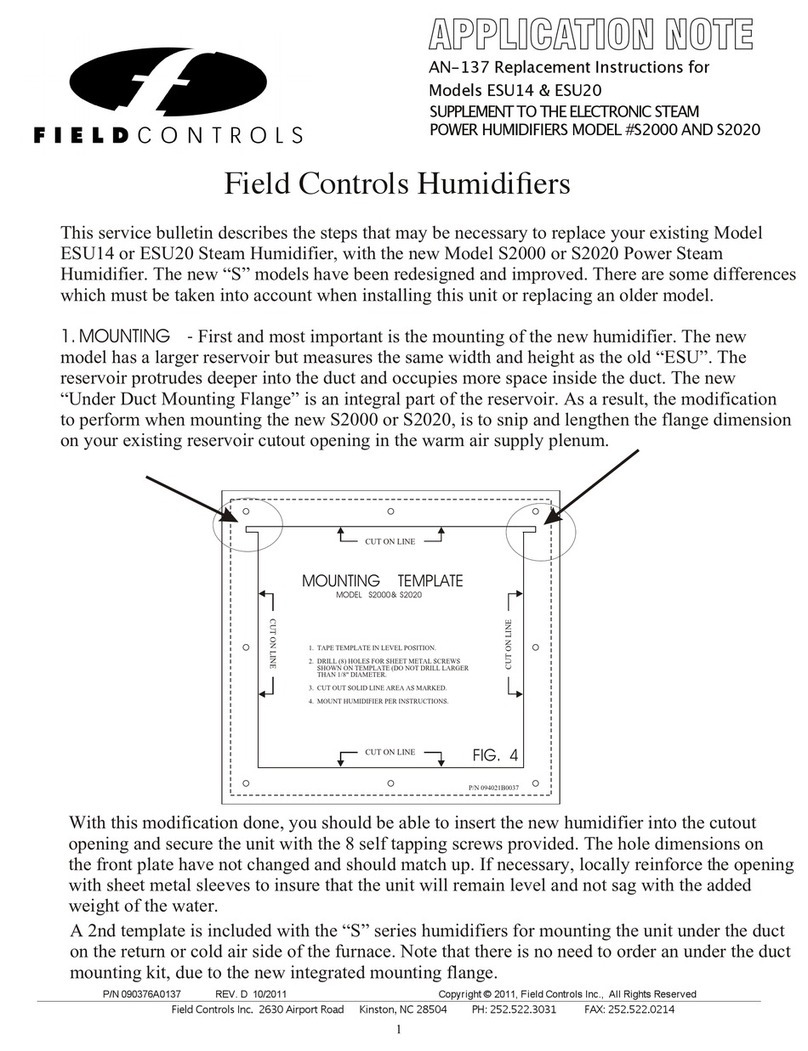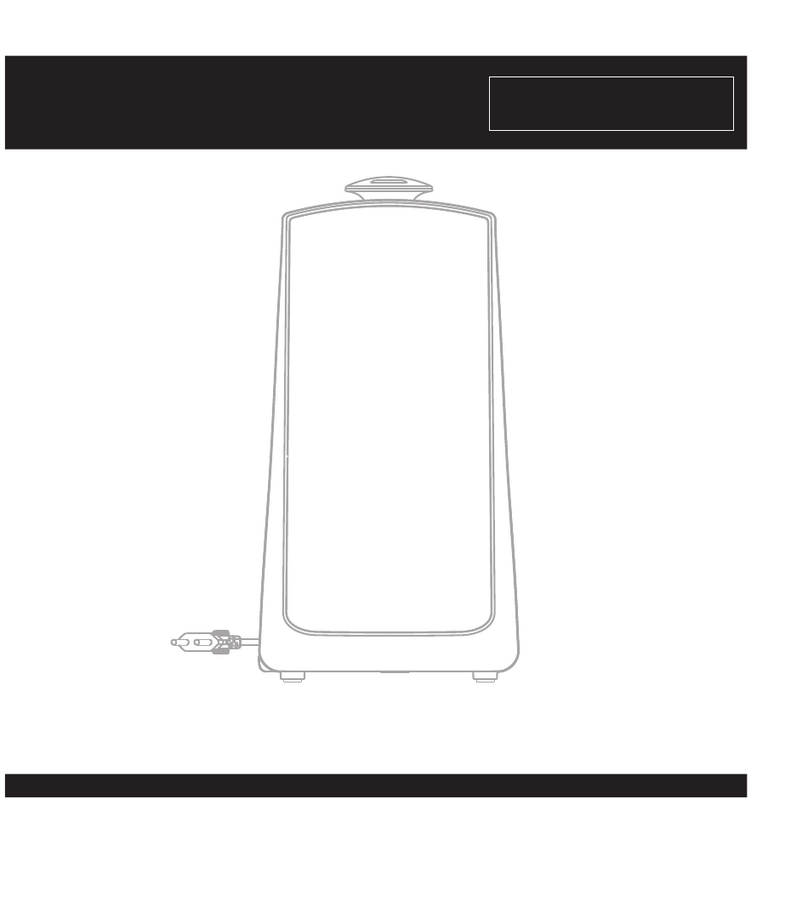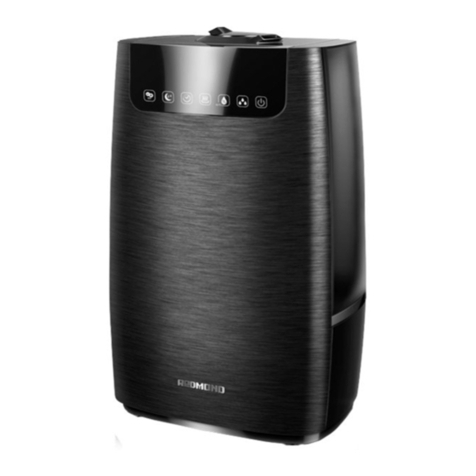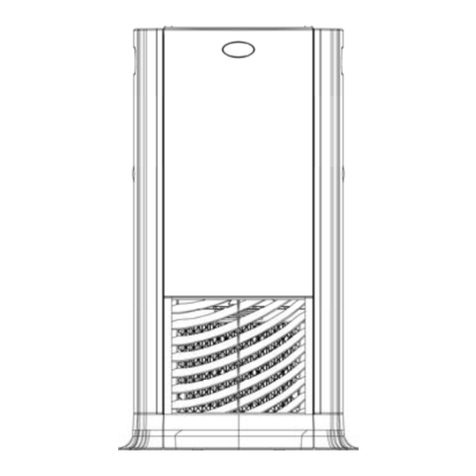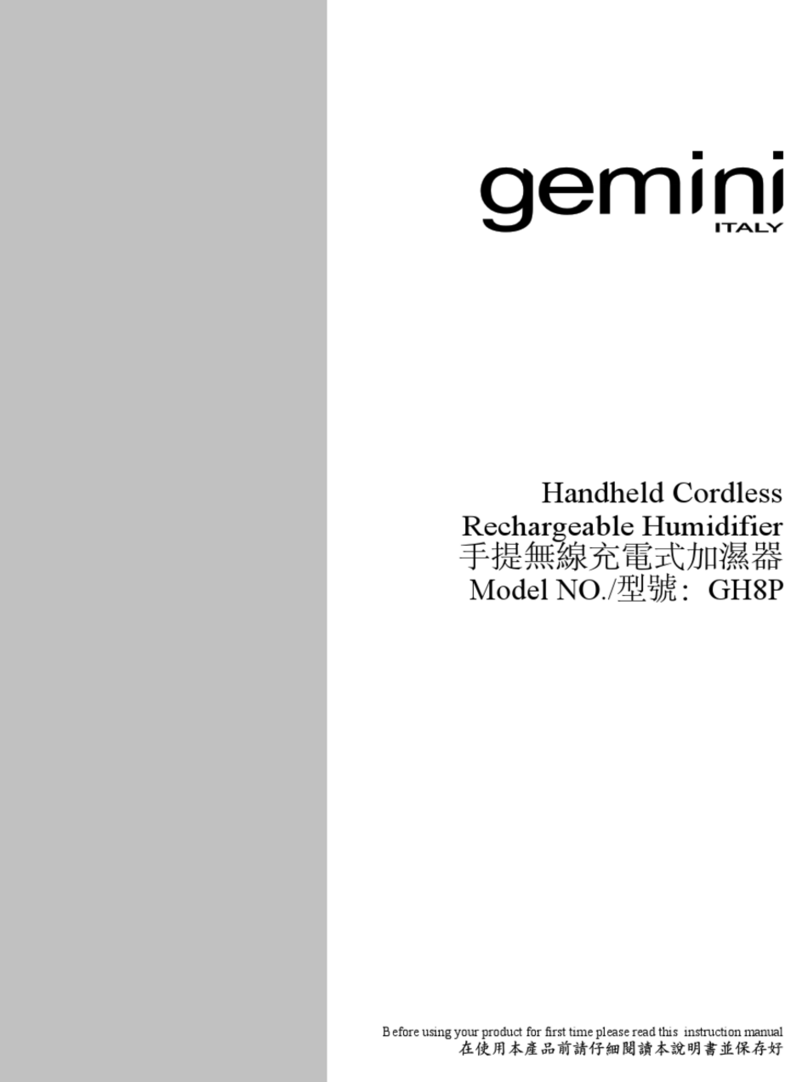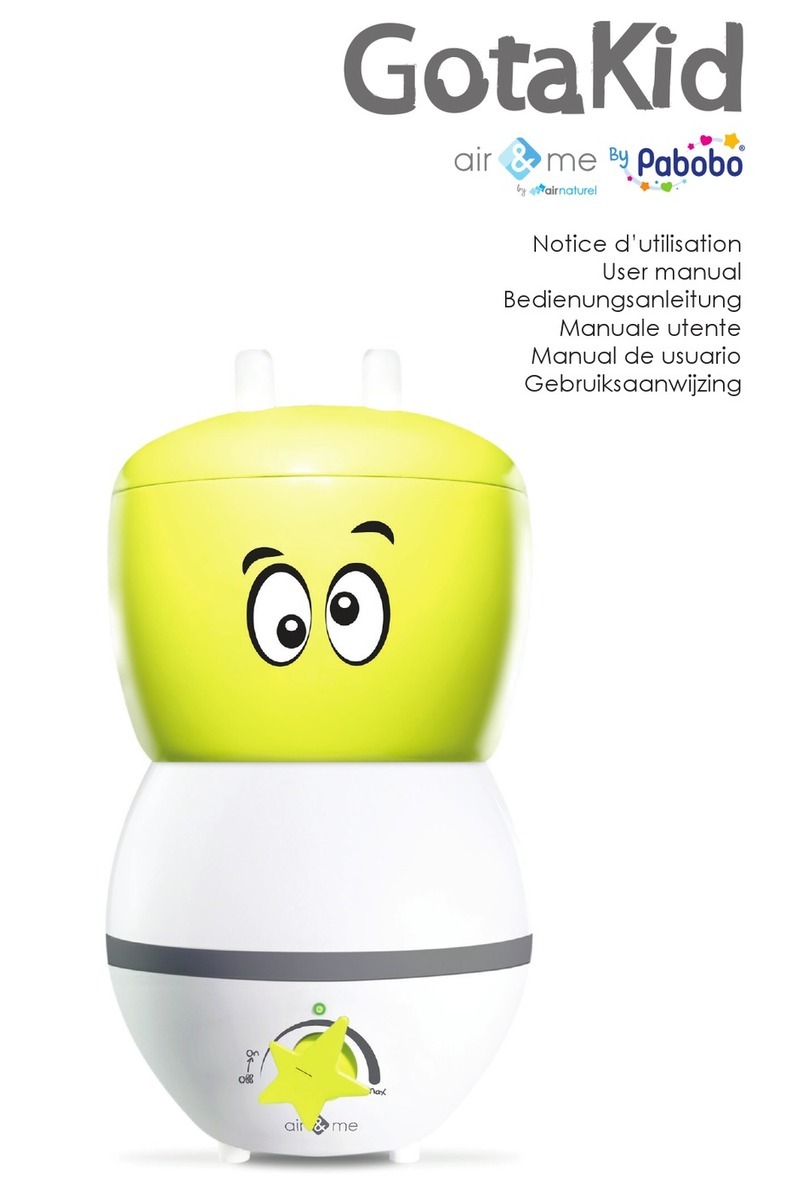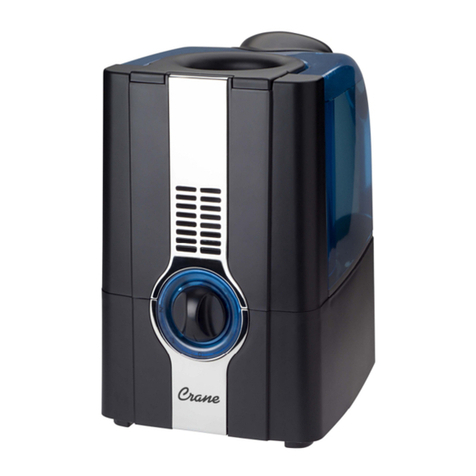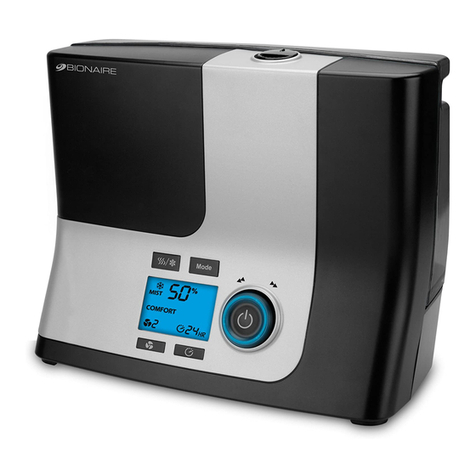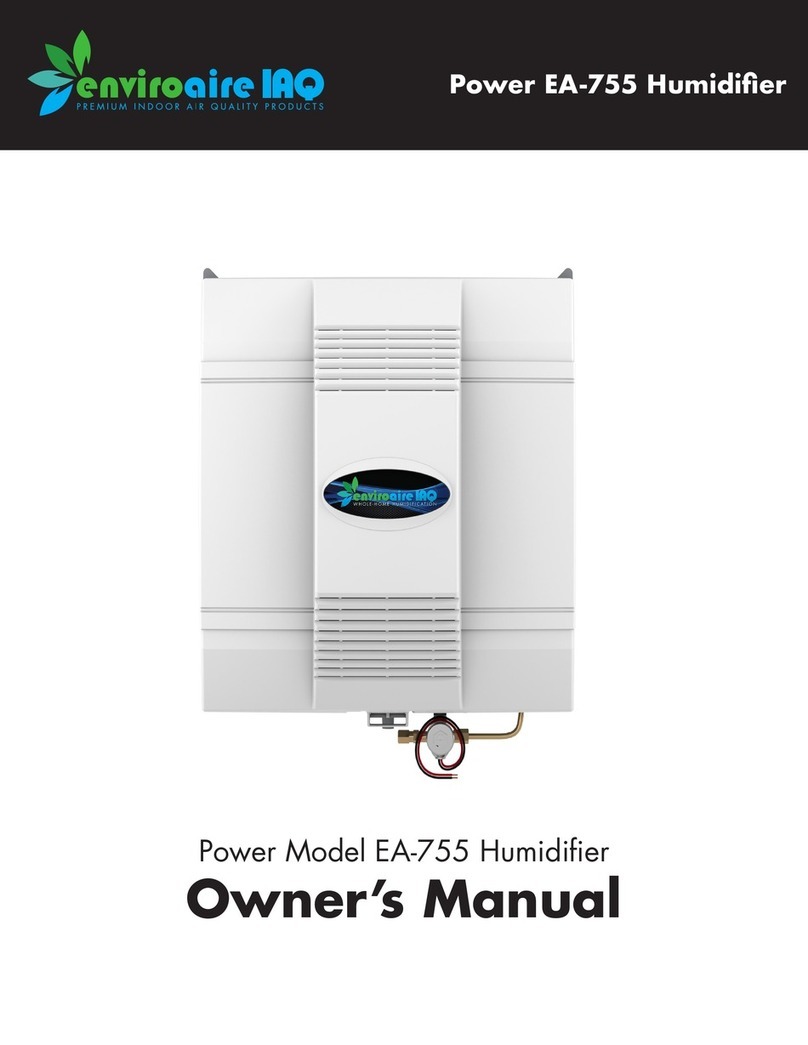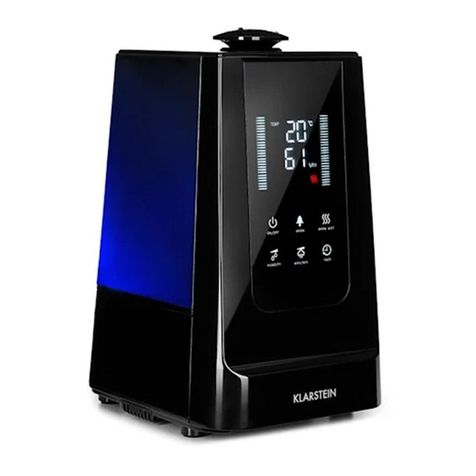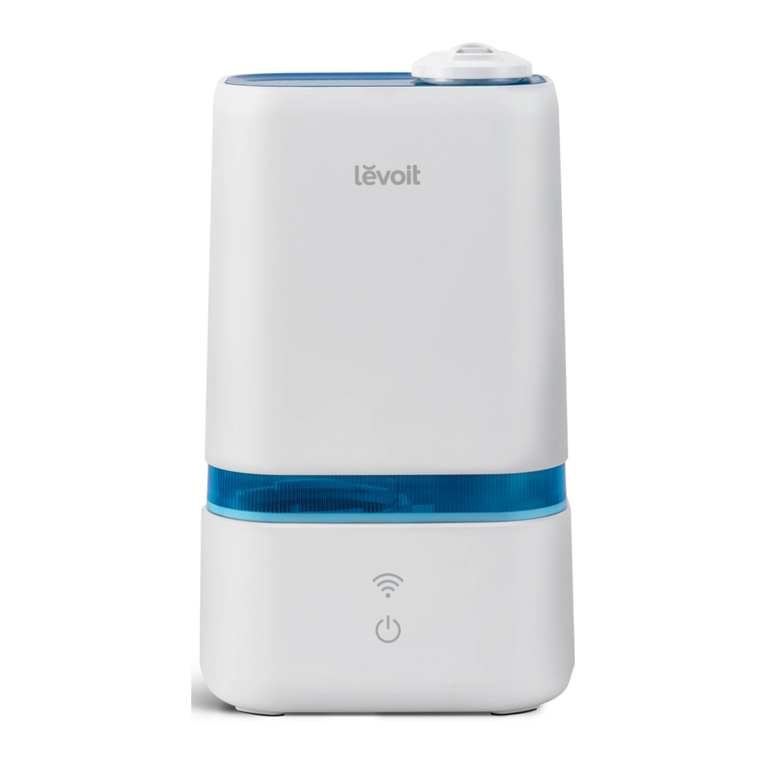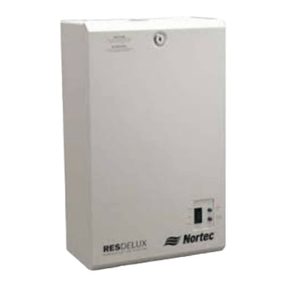Prolix music VERTIGO User manual

VERTIGO
ADVANCED INSTRUMENT
HUMIDIFICATION SYSTEM

Why should I humidify my instrument?
The wood your guitar is made from is a living, breathing material. It slowly
absorbs moisture from the air when it is humid, and slowly releases it when
it is dry. This causes the wood to expand and contract, which eects the
action (playability), structural integrity and resonance of your guitar. This is
why you need to humidify.
How does humidity aect my instrument?
When it is humid, the body slowly swells as it absorbs moisture from the
air. Conversely, when it is dry, the body slowly shrinks as it loses moisture
to the air. The amount of moisture in the wood is known as Moisture
Content (MC).
What do humidiers do?
Humidiers work through the diusion of water vapor with the air. Lower
vapor pressure in the air causes water to evaporate from the humidier
and be absorbed by the air, balancing the vapor pressure throughout. This
is known as the process of equilibration. Similarly, wood gains or loses
moisture by equilibrating with the air around it, but at a much slower
rate. This is good because it means that you don’t need to supplement the
humidity all the time - you should only humidify when your guitar needs it.
What is the ideal humidity?
Most manufacturers use tone wood that has been equilibrated to a 50%
Relative Humidity (RH) environment. Hence the ideal humidity is 50%
RH. However, it is the Moisture Content (MC) of the wood we are more
concerned about, not necessarily the humidity of the air. Luckily, wood is
slow to equilibrate, making it immune to daily uctuations of high and low
humidity. As such, it is a myth that you must maintain an absolute 50%RH
continuously. Instead your aim should be to maintain a long term average
of 45-55% - nominally 50%.
Does temperature aect humidity?
Humidity is a relative thing, hence the term RH. It is relative to the capacity
of the air to absorb moisture in vapor form. As you heat air its capacity
increases, causing the relative humidity to drop. This is why, despite
having reasonable outdoor humidity, it can feel really dry once the air is
heated in your home.
What if I don’t humidify?
If you don’t humidify, you may be playing a game of Russian roulette
with your guitar. Changes in MC will aect the action of your guitar, the
resonance of the soundboard, and can even result in structural failures
such as failed glue joints, as well as cracks in the body.
If I live in a humid climate do I still need to humidify?
It really depends. Heating and air conditioning can signicantly aect
indoor humidity, so you cannot always rely on outdoor humidity as your
guide. Ideally you should measure the humidity in the room your guitars
live in before making a decision.
Should I humidify all the time?
NO, NO and NO! Only humidify when your guitar needs it. If you humidify
all the time you risk adding too much moisture to the wood, which can be
just as bad as being too dry. Think of it in the same way as heating your
home. The furnace only runs when it needs to, not all the time.
How should I humidify?
It depends on how you use your guitar. If you keep your guitar out, play
often, and it was set up professionally, then we would recommend using
the action (playability) of your guitar as your guide of when to humidify
and when to stop. Be warned that if you keep your guitar entombed in a
case, you must use a fully functional hygrometer and monitor it daily to
prevent over humidication.
Why did we invent the Vertigo humidication system?
The Vertigo system was created for musicians who like to play and display
their guitars. The Vertigo pack contains the only humidier with the
capacity, eciency, and performance to supplement the Moisture Content
of your guitar while it is sitting on a stand. It’s also the only humidier that
doesn’t get in the way when you play.
How does the Vertigo guitar humidier work?
The Vertigo humidier uses a super absorbent polymer core to hold water
in a solidied form. The polymer can hold upwards of 100times its weight
in water, making it one of the most ecient absorbents on the planet.
That said, the polymer is more delicate than a sponge, which is why you
shouldn’t squeeze, wring or otherwise abuse it.
How long does hydrating take?
All tap water contains a variety of solutes, which can vary in concentration
from one municipality to another. The higher the concentration, the
slower charge time. Consequently, charging can take any where from
30-90 minutes.†
Should I use distilled water?
Only if you want to waste money. The Vertigo humidier can use distilled
water, but it is not really necessary. Clean, cold tap water is ne.
How long will it last in my guitar?
That depends… There are many factors that aect how long the Vertigo
humidier will last – how dry the guitar is, how dry the room is, whether
the guitar is in a case or not, and so on. Under normal conditions, we
anticipate 7-10 days. Please be aware that the humidier is highly
ecient. As such, unlike other humidiers, you will not need to humidify
all the time – only when your guitar needs it.
Can I use the Vertigo system with other instruments?
Yes, you can, but you really need to understand when to humidify and
when to stop. The Vertigo system is marketed for guitars, consequently the
instructions pertain solely to guitars.
Can the polymer disappear?
No… It will shrink back to its original size, so it might appear to.
Will the polymer damage my guitar?
No… The polymer will not damage your guitar. It is non-toxic, and holds
water in a solidied form, only releasing it as vapor.
Can I recharge the Vertigo humidier
before it is fully discharged?
No… Overcharging will damage the polymer.
Can I squeeze the Vertigo humidier?
No… Squeezing, wringing or applying excessive pressure can damage the
polymer core and may invalidate your warranty.
Should I read these instructions?
Um… of course… If you don’t, then you only have yourself to blame if
things go wrong.
Why does the Vertigo humidier carry a 3 year warranty?
We want you to have peace of mind that you are buying a quality product.
We stand by our product ecacy of the Vertigo humidier, we wouldn’t
oer a warranty at all.
Why register for my warranty?
If you bought the Vertigo humidier system from elsewhere, registering
will activate your warranty.
Problems? Simply contact: [email protected]
Your questions… answered

Open the container that doubles as a gig box
for small objects (picks/batteries), and as the
hydration station for your Vertigo humidier.
Remove the humidier, the microber drying
cloth and the instruction booklet.
Read this instruction booklet thoroughly -
which thankfully you are doing - this will save
you from wasting time and make sure you
have the best humidifying experience!
Insert the Vertigo humidier into the your
hydration station.
Fill the hydration station with cold, clean tap
water to the Max Level indicated by the line
on the outside of the container.
Compress the humidier by placing the lid
over the exposed end and push down until
the lid snaps closed.
Leave for ~40 minutes.
With the humidier compressed and the lid
on, the humidier will reach ideal capacity
(between 70-90ml) in around 40 minutes†.
Hydrating the humidier with the lid o will
result in uneven absorption, and may damage
the polymer. Charge times will also be
signicantly longer.
Once hydrated, remove the humidier from
the container and gently dry the outside with
the microber cloth.
Instructions for use
And that’s it, you’re good to go.
DO NOT squeeze, wring or apply excessive
pressure to the humidier. This can damage
the polymer beads and may cause extrusion.
DO NOT double charge. There is enough
polymer inside the Vertigo humidier to
absorb 100 times its dry weight.
Over charging may damage the polymer and
invalidate your warranty.
Rarely, while charging, very small amounts
of polymer extrusion may occur. If you do
experience this, simply wipe away.
The polymer can’t be absorbed by your guitar
and will not harm the wood of
your instrument in any way.
If you’re unsure with what you’re doing please
contact our customer service team.
Remember, never over humidify.
* Package contains 1 or more humidiers as
specied on the retail label.
† Times can vary by region.
Contains Sodium Polyacrylate. Keep away
from animals and children. Do not swallow.
If ingested, seek medical attention.
Register your 3 year warranty.
prolixmusic.com/v-register
Water level must not
exceed the Max water
line with the humidier
in the hydration station
STEP 2
Compress the
humidier by
placing the lid
over the exposed
end. Push down
until the lid
snaps closed.
STEP 1
Insert
humidier.
Pour water
to the Max
water line.
Water level must
not exceed the Max
water line with the
humidier in the
hydration station
Microber cloth
STEP 5
Use the microber cloth
to dry the humidier
STEP 4
Once hydrated,
take-o the lid,
and remove the
Vertigo humidier
Water level,
with the lid o,
after hydration
Lid
STEP 3
Leave for ~40 minutes.
Specied rates of hydration are
approximate and will be aected
by the purity of the water.
Water level will visibly
drop as the polymer
starts absorbing the
water as a solid

So you’re a player huh?
Well you’ll love that when the humidier is
in your guitar you can still pick it up and play,
knowing it’s still being humidied.
Simply slip the Vertigo humidier into the
sound hole.
The monolament acts as a barrier, only
allowing evaporated moisture to equilibrate
with the air inside your guitar, not directly
with the wood. This ensures the entire body
of your guitar is evenly humidied.
Only humidify your guitar when it needs it.
If your guitar was set up properly, you can
feel it when you play. When the action is too
low, and you feel fret buzz coming on, you will
know it is time to humidify, and when that
sweet action returns, it’s time to stop!
Over time the humidier will shrink back in
size, indicating that it is time to rehydrate.
To remove the humidier, with the sound
hole facing up, raise the bottom of the guitar
allowing the humidier to slide toward the
neck. Then, gently rotate the body around the
axis of the neck until the humidier appears at
the sound hole.
You like to show o those beautiful guitars,
don’t you?
Don’t fret (pun intended), you can leave the
humidier inside your guitar or hang it between
the strings, if you’re into that kind of thing.
We get it, if you’re not quite ready to change a
habit of a lifetime, that’s cool too. Either way,
it’s up to you!
To hang it between the strings, separate the
middle strings at the center of the sound hole,
lower one end of the humidier through the
gap, into the sound hole. Then, gently release
the strings, allowing them to grip the notches
on the edges of the end cap.
And there you have it, your beauties lined
up with only the tiny end cap showing.
Oh, and if you make a mistake and it falls into
the sound hole, it’s easy to retrieve.
With the sound hole facing up, raise the
bottom of the guitar allowing the humidier
to slide toward the neck. Then, gently rotate
the body around the axis of the neck until the
humidier appears at the sound hole.
Over time the humidier will shrink back in
size, indicating that it is time to rehydrate.
Feel the Action
What kind of musician are you?
You don’t have a four inch hole in the middle
of your body, or for some reason you prefer to
keep your guitar in a case because that feels
right for you, but be warned.
Be warned, hardshell cases prevent the
exchange of moisture with air outside
the case. If you don’t own a functional
hygrometer - it’s time to get one!
Using a case with the Vertigo humidier will
greatly reduce the time required to correct the
moisture content.
Excess moisture can be damaging.
If you choose to humidify like this,
do so at your own risk!
Place a hygrometer inside the guitar, as this
is where humidity levels are important. Close
the case, and monitor the humidity.
When the humidity inside the body drops
below 45% RH, place the humidier inside
the case near the headstock, and when the
humidity approaches 55% RH, remove it.
Over time the humidier will shrink back in
size, indicating that it is time to rehydrate.
Simply remove from the headstock area and
rehydrate. Make sure you don’t over humidify!
Normal - Bridge position correct with ideal action
Correct Radius
Wet - Bridge lifts, high action makes it hard to play
Swollen Radius*
*Exaggerated for clarity
Dry - Bridge sinks, low action causes fret buzz
Sinking Radius*
*Exaggerated for clarity
When it drops below 45% RH you will know it is
time to humidify, and when it exceeds 55% RH
you will know it’s time to stop.
Don’t be fooled by the outdoor humidity.
Relative Humidity is temperature dependent.
As such, heated indoor air is often much drier
than the air outside.
Remember, you’re aiming to maintain sweet
action by regulating its moisture content through
humidication over long periods of time.
Humidify only when your guitar needs it, and
not all the time is best.
Daily uctuations have little eect, so play,
enjoy,and love your guitar.
Too much moisture can be equally damaging.
If you play regularly, keep your guitar out, and
it has been set up professionally - drop in the
humidier when the action gets too low, and
remove it when that sweet action returns.
If you keep your guitar in a case, monitor the
humidity inside the sound hole.
Only humidify when the guitar needs it - not all the time.
The Player? The Exhibitionist? The Head Case?

Prolix Music LLC, 1014 West 36th Street,
Baltimore, MD 21211.
(443) 228-8884
prolixmusic.com
For the Fans. For the Artists. For the Music.
